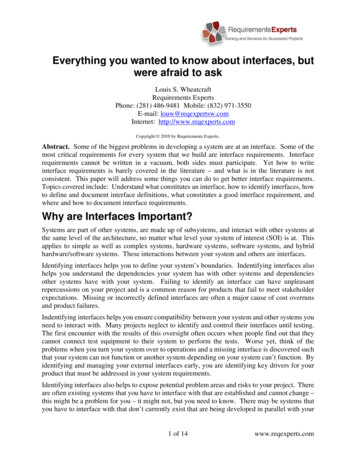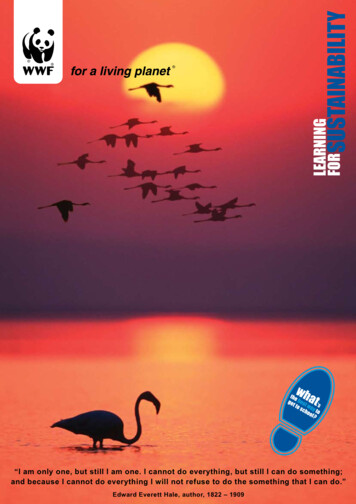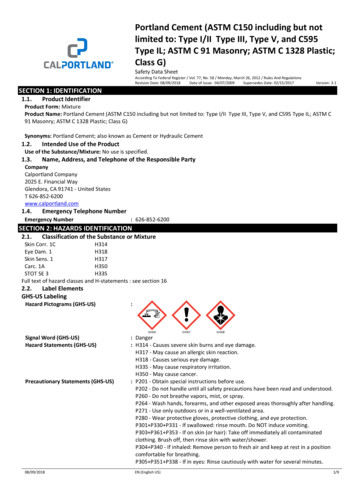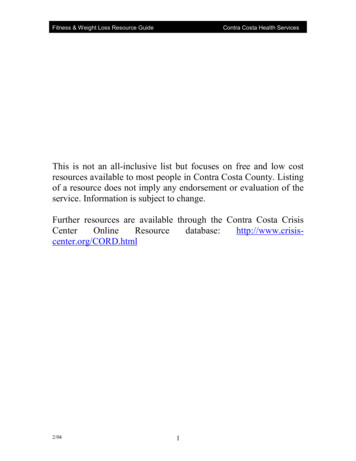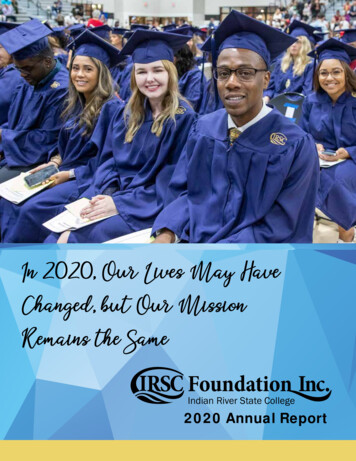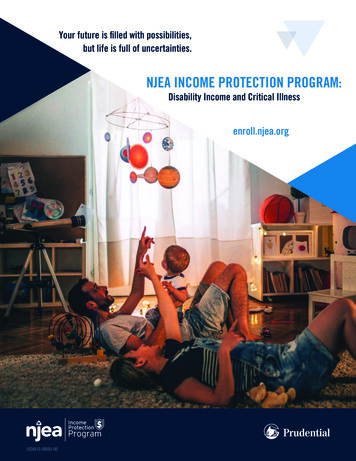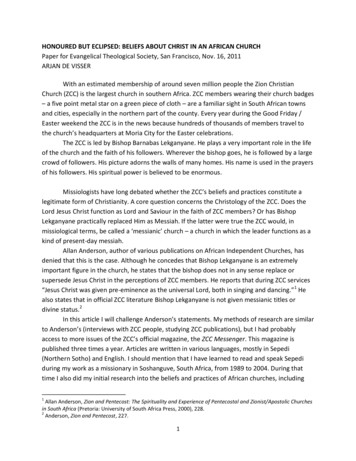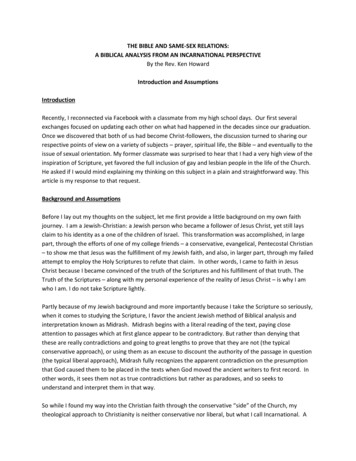
Transcription
International Journal of Humanities and Social ScienceVol. 2 No. 17; September 2012Same, Same - But Different: The Development of Cultural Humility through anInternational Volunteer ExperienceJean Schuldberg, Ed.D, MSW/LCSWProfessorMSW Program DirectorSchool of Social WorkCalifornia State University, Chico, 400 W. First Street, Butte Hall 519Chico, California 95929-0550, USANicole S. Fox, MADepartment of SociologyBrandeis University, MS 071Waltham, Massachusetts 02454, USACelesta A. Jones, PhD, MSWProfessorDirector - School of Social WorkSchool of Social WorkCalifornia State University, Chico, 400 W. First Street, Butte Hall 511Chico, California 95929-0550, USAPatty Hunter, MSW/LCSWAssociate ProfessorField Education DirectorSchool of Social Work, California State University, Chico400 W. First Street, Butte Hall 529, Chico, California 95929-0550, USA.Michele Bechard, MSWSocial WorkerButte County Children Services, 11 Heartwood CourtChico, California 95928, USALenette Dornon, MSWShelter CoordinatorNorthern California Youth and Family Programs2577 California Park Drive, Chico California, 95928, USA.Stacey Gotler, MSWSenior Social WorkerShasta County Children and Family Services, 500 Hilltop, Apt. 256, USA.Holly M. Shouse, MSWChild Protective Services Social Worker IV240 Natoma Station Drive Apt. #258, Folsom, California 95630, USA.Madison Stratton, MSW1089 Windsor way, Chico, California 95926, USA.17
Centre for Promoting Ideas, USAwww.ijhssnet.comAbstractWithin the social work profession, respect and humility for cultural difference is paramount. Cultural competencein social work education curriculum focuses on increasing cross-cultural knowledge and practice skills. Culturalhumility suggests that equity and social justice issues must be examined within and outside cultural experiences,and that in doing so this reflection will invite self -awareness and evaluation on how culture impacts practice.This study was designed to investigate the development of cultural humility of graduate social work (MSW)students through an international cultural experience in Bangkok, Thailand. It explored the benefits andchallenges of a short term volunteer experience and the impact of this experience on students’ personal andprofessional development. Volunteer placements in social service settings provided students the opportunity tocompare and contrast international social and community services with those offered in the United States. Postanalysis of self-reflective journals suggested that short- term cultural immersion experiences may be an effectivemethod for increasing cultural humility among student participants.Key words: cultural humility, volunteerism, cross-cultural experience, international social work1.0 Cultural competency in social work curriculum focuses primarily on increasing cultural knowledge andpractice skills, with less emphasis on student self-reflection and self-critique. The concept of cultural humilityadds this dimension by requiring the individual to examine equity and social justice within and outside culturalexperiences (Tervalon & Murray-Garcia, 1998). Reflection invites self-awareness and evaluation on how cultureimpacts practice. As Reynoso-Vallejo (2009) states, “cultural humility deals with understanding whereas culturalcompetence with knowledge” (p. 68). Our understanding of reflection is enriched by Paulo Freire’s (1999)conception of praxis that involves a recursive process of action and reflection.In addition, cultural humility emphasizes the commitment that as professionals, self-reflection is ongoing andcontinuous for practicing awareness and understanding of culture. Within the social work profession, respect andhumility for cultural differences is paramount. Core curriculum within social work programs, mandated by theCouncil on Social Work Education (CSWE), emphasizes coursework and content on diversity, equity, and socialjustice (CSWE, 2008). The standard in the National Association of Social Workers (NASW) Code of Ethics(2008) provides specific attention to cross cultural knowledge, skills, and leadership. It is imperative that socialworkers gain greater knowledge and understanding in culturally appropriate practices.In light of the dynamic trends in social work, this study was designed to investigate the development of culturalhumility through a short-term volunteer and cultural immersion experience in international social service settings.Five MSW students and one post one-year MSW graduate participated in a two-week intensive cultural andvolunteer experience in Bangkok, Thailand. The following areas were investigated in this study: 1) participants’identification of the differences and similarities of the roles of community and social services in Thailand and theUnited States; 2) participants’ understanding of the complexities of ethnocentricity, which support thedevelopment of cultural humility; and 3) the benefits and challenges of a short-term international volunteer andcultural experience.2.0-Review of the Literature2.1 California DemographicsThe site for the international cultural experience was chosen due to the demographics of the region served by theUniversity. The State of California is unique in the nation for an extremely large culturally diverse population;over half the population is non-Euro-American (U.S. Census Bureau, 2010). The foreign born population inCalifornia is 28 % compared to the 11.8% of the entire U.S. population (U.S. Census Bureau, 2010). California ishome to the largest Asian population in the U.S. with 13% of our community Asian versus 4.8% in the U.S. as awhole (U.S. Census Bureau, 2010). There are approximately 247,595 Hmong individuals in the United Stateswith approximately 91,224 residing in California. Fifteen to 20% of all Hmong people in the U.S. reside inNorthern California (Hmong National Development, Inc., & Hmong Cultural and Resource Center, 2003). TheIu-Mien population in the U.S. is approximately 35-50,000, with the majority residing in California; thirteenthousand of the U.S. Iu-Mien community resides in the Northstate (Schuldberg, 2005, United States CensusBureau, 2010).18
International Journal of Humanities and Social ScienceVol. 2 No. 17; September 2012Most of the Hmong and Iu-Mien people in the United States came from refugee camps in Thailand prior to theirclosure in the mid 1990s. Thus, many aspects of the Thai culture are similar to those of the Hmong and Iu-Mienpeople.2.2 Service Learning/Volunteering and the Development of Self-AwarenessIn recent years, research has explored the integration of service learning volunteer programs and curriculum.Sternberger, Ford, and Hale (2005) define service learning as “a form of experiential education in which studentsengage in activities that address human and community needs together with structured opportunities intentionallydesigned to promote student learning and development” (p. 77). These service-learning opportunities areparticularly popular in the field of behavioral and social sciences (Joseph, Stone, Grantham, Harmancioglu, &Ibrahim, 2007).Incorporating service learning opportunities into curriculum has been shown to increase student self -reflection,interpersonal skills, as well as course content skills. The integration of reflection in the education process isparamount for student professional growth and personal development (Jacoby, 1996; Sternberger, Ford, & Hale,2005; Sullivan, 1999). Gaining practical experience from engaging in service learning activities and applyingskills in a “real-world” setting allows students to connect theory and practice (Joseph et al., 2007).Volunteering can bring challenges and rewards to individuals; volunteers have reported experiencing a sense ofcommunity, self-awareness, and social responsibility as a result of their volunteer experience (Joseph et al. 2007).For some volunteers, the experience involved community, teamwork, satisfaction, social issues, and selffulfillment. Volunteering has been associated with self-realization, empathy, a desire to help others, traveling,cultural similarities and differences, and opportunity (Skoglund, 2006; Wymer & Starnes, 2001). Culturalhumility and the opportunity to learn about cultures different from one’s own are often part of the service learningprocess (Sternberger, Ford, & Hale, 2005).Along with positive experiences, realizations regarding stress and challenges have been highlighted in theliterature. A qualitative study conducted about the stresses of volunteering in a hospice setting yielded insight intochallenges that volunteers may face in their work setting (Dein & Abbas, 2005). Stress was described as moreprominent in the beginning of placements and focused on the unknown and unfamiliar aspects of the experience.Stress was reported to decline as volunteers became more comfortable with the volunteer setting. Coping withstress was related to age and life experience; the research indicated that coping styles/strategies may improve asone ages (Dein & Abbas, 2005).Service learning experiences yield insightful and meaningful experiences for volunteers. Research supports thepremise that service learning complements education and life experience by providing hands-on, real lifeinteractions and environments (Sternberger, Ford, & Hale, 2005). Service learning is associated with growth anddevelopment in personal, cultural, and educational realms (Dein & Abbas, 2005; Sternberger, Ford, & Hale, 2005;Skoglund, 2006).2.3 Service Learning and Volunteering AbroadRecent research on international service learning has focused on study abroad programs. Studies suggest thatintegrating an international service element produces more in-depth learning for students. Pisano (2008)conducted a case study of the experiences of students participating in the International Partnership for ServiceLearning and Leadership (IPSL) program in Ecuador. Service learning was revealed to have provided growth inknowledge, cultural awareness, values, and the development of career options.In a study conducted in Australia, Devereux (2008) noted that service learning outside the country contributes tolong-term change in student’s growth. However, Devereux cautioned, “At its worst, international volunteering canbe imperialist, paternalistic charity, volunteer tourism, or a self-serving quest of career or personal developmenton the part of well-off Westerners ” (p. 358). Devereux related the importance of partnering with communities toensure a mutual understanding of the needs that are relevant to the community. Volunteerism without thiscollaboration may only benefit the volunteer’s personal growth, while not addressing the areas most beneficial toimpact change for the partner (Devereux, 2008; Lough, 2009).19
Centre for Promoting Ideas, USAwww.ijhssnet.comStudent learning through service learning and volunteer experience increases when characterized by “meaningfulrole taking, support, reflection, intensity and reciprocity” (Lough, 2009, p. 472). Students gain increasedknowledge and awareness of poverty, power, and social justice challenges, and “ international social work fieldplacements are to be ‘transformative’ in ways that lead to respect for diversity and strong commitment to socialjustice” (Lough, 2009, p. 475).2.4 Values: A Shift in Perspectives through International ExperiencesThe literature on students’ assessment of personal, professional, and societal values and shifts during and afterinternational experiences is well documented (Ford & Ericson, 2003; Lough, 2009; Pisano, 2008). Ford andEricson examined changes in attitudes and perspectives of BSW students during an international educationalexperience in the Netherlands. Students who had traveled for the first time, according to a pre and post survey,perceived themselves as having greater respect and empathy of others’ viewpoints, increased skills incompromising, making ethical judgments, and in turn, taking action. Further, students who had traveled abroadpreviously rated being able to communicate their needs more effectively over the course of the international fieldexperience. Ford and Ericson also found that a significant number of students shifted their perspective regardingsocial issues due to the influence of their international exposure.Gilin and Young (2009) confirmed students’ increased awareness in social issues and the ability to view practicesin the United States from a new lens after an international experience. One student who participated in a programin Italy from the study stated “. . . we can often hold onto our misconceptions without even knowing it. . . Insocial work . . . often times we are told to put aside or dispel our myths when working with the unknown. Howmuch more real does this resonate inside of me than ever before!” (Gilin & Young, 2009, p. 43). The developmentof values was also identified in a study of BSW and MSW students’ experiences in a study abroad program inScotland (Lindsey, 2005). Students reported insights and changes of personal values and beliefs. In addition,students examined the relationship between their own personal values, the values of the other country, and thevalues of social work (Lindsey, 2005).2.5 Service Learning Impacting Views of Privilege and PowerFor several decades, social workers and scholars have evaluated the process by which individuals develop anunderstanding of privilege and power (Cagle 2010; Latting 1990; Perry & Shotwell, 2009). Educators have foundservice-learning programs, volunteer experiences, and international fieldwork as sites where criticalconsciousness develops (Rosenberger, 2000) in regard to a multitude of injustices, including racism, sexism,ageism, heterosexism, and ableism. The process of educating students for the field of social services andeducation includes the facilitation of self-awareness, cultural humility, and interpersonal skills (Bender, Negi, &Fowler, 2010; Chau 1990; Segal, Gerdes, Stromwall, & Napoli, 2010). International service learning experiencesprovide a forum for this development.2.6 Trends in International Social Work EducationHistorically social work has been considered an applied profession and subsequently the emphasis of itsbaccalaureate and masters level programs have been on preparing students for practice (Healy, 2001). Anincreasing globalized and complex world that includes technology and reduces barriers for dialogue and exchangeallows for social workers to acquire a worldview of social issues that cross cultural boundaries. International ortransnational social work is a growing trend in social work education and opportunities for international fieldplacements continue to emerge (Carrillo & Mathiesen, 2006). As the literature indicates, outcomes reveal agreater understanding of cultural diversity and mutual respect and provide a forum for the development ofcollaborative, international relationships (Engstrom & Jones, 2007; Lager, Mathiesen, ,Rodgers, & Cox, 2010;Mathiesen, & Lager, 2007). The use of international opportunities for students in the field of social workrepresents only a fraction of social work education and academic literature.Weiss (2005), through an analysis of common themes of social work values in social work education, examinedthe perspective of the International Federation of Social Workers (IFSW) (2004) to determine whether there isindeed a commonality to international social work education, theory, and practice. The research indicated thatalthough aspects of social work are global, some are context-contingent. Social work is a diverse field and thuslocal culture and global concerns shape practice and determine the focus for social work education (Holtzhausen,2010; Weiss, 2005).20
International Journal of Humanities and Social ScienceVol. 2 No. 17; September 2012According to Askeland and Payne (2006), international social work education has had a tendency to “allowpowerful cultures to dominate less powerful” (p. 731). With the prevalence of the spoken English language, and areported international appeal of American culture, attempts by Westerners to broaden the scope of internationalsocial work education may inadvertently perpetuate this power imbalance (Askeland & Payne). Askeland andPayne caution that international social work education may encourage homogeneity and assume universalknowledge that is applied to all cultures. This may lend to a lack of recognition or even negation of the indigenouscultural values and practices in educational and practice settings (Askeland & Payne, 2006; Holtzhausen, 2010;Yip, 2005). The universal application of the NASW Code of Ethics (2008) can result in challenges when culturalvariations and interpretations conflict (Healy, 2007; Holtzhausen, 2010).International social work education can facilitate the sharing of locally relevant practices with internationallyrecognized theory and practice. This allows social workers to “crystallize their wisdom” (Yip, 2005, p. 603) fromthe local culture while integrating practice from Western countries. This creates an opportunity for a rich andbroad perspective in social work practice. Greater research is needed to gain insights into the benefit of thedifferent models being used to provide social workers with a broader worldview, including volunteering abroad,short term and long-term cultural immersion, and international field practicum placements. Analysis of thesevarious models and their long-term benefits for social work practitioners worldwide, could lead to development ofgreater transnational collaboration and enhanced social work education preparation to meet the needs of ourglobal community.3.0 Background3.1 The Host ProgramCross Cultural Solutions (CCS) is an international, nonprofit organization that has provided opportunities forindividuals and families to volunteer abroad in 12 countries since 1995.1 This comprehensive program provideshousing, country cultural meals, cultural experiences including field trips, language lessons, cultural lectures andactivities, and placement and supervision in volunteer sites. The cultural and volunteer activities are tailored tothe group and meet the needs of the host community. The organization also collaborates with social workprograms to provide internships that meet the requirements for field practicum.3.1 A Project Preparation with CCS and UniversityThe CCS Bangkok, Thailand program was evaluated nine months prior to this volunteer experience; one of theprofessors facilitating the project met with the Thailand Program Manger in Bangkok. Following this first contact,communication with the New York office of CCS occurred on a weekly basis to solidify student volunteerplacements, cultural activities, and site visits. CCS secured the placements that included primary/middle schools,day care centers, and an older adult comprehensive program that provided residential, medical, and social services.All of the placement sites are considered social service delivery programs in Thailand. The placements providedstudents direct practice and matched the School of Social Work focus areas of family, children and youth,gerontology, and mental health. The students were supervised by the CCS Thailand Program Manager, who holdsa degree in nursing, a master degree in counseling, and has extensive work with the Peace Corps, social services,and regional non-governmental agencies (NGOs). Additionally, three social work faculty who participated in thisproject provided daily supervision for the students in Thailand.Daily field trips were facilitated by CCS and included meeting with social workers, administrators, and faculty atThammasat University School of Social Administration, Thailand Health Administration, and Bangkok MunicipalSocial Services. Cultural trips included visits to an agricultural collective, the palace, a lecture and interchangewith a Buddhist monk, temple visits, and other cultural sites in the region. Additionally, the host s
Chico, California 95929-0550, USA Patty Hunter, MSW/LCSW Associate Professor Field Education Director School of Social Work, California State University, Chico 400 W. First Street, Butte Hall 529, Chico, California 95929-0550, USA. Michele Bechard, MSW Social Worker Butte County Children Services, 11 Hear
